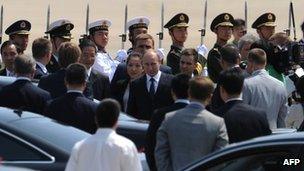Russia-China unity on Syria as Putin arrives in Beijing
-
Published

China and Russia have reinforced their opposition to foreign intervention in Syria, as Russian President Vladimir Putin arrived in Beijing.
A Chinese foreign ministry spokesman said both countries remain opposed to forced regime change and urged support for UN envoy Kofi Annan's peace plan.
Mr Putin is at the beginning of a three-day visit to China to bolster relations and attend a security summit.
Both countries have twice blocked UN resolutions critical of Damascus.
Beijing currently holds the UN Security Council's rotating presidency, and Russia and China have long resisted pressure to remove Syrian President Bashar al-Assad from power amid ongoing unrest.
The statement came as Syria announced that ambassadors from several Western states and Turkey are unwelcome (personae non gratae).
There were also reports of fresh violence around Syria, further raising questions about the viability of Mr Annan's peace plan.
Syria's rebel Free Syrian Army (FSA) said on Monday it was no longer committed to the nominal ceasefire.
Energy talks
Energy and foreign policy expected to dominate the agenda of Mr Putin's trip to China.
The Russian president said ahead of the trip that he wanted to further boost booming bilateral trade, which reached $84bn (£55bn) last year.
The Russian leader is taking to Beijing six cabinet ministers, the head of gas giant Gazprom and other energy companies.
Some 17 major business and trade deals between Russia and China are expected to be signed in Beijing, Mr Putin's aides say.
But it remains unclear whether this will include a long-awaited gas agreement that would allow Moscow to supply some 70bn cubic metres (2472bn cubic ft) of gas to its neighbour.
Latest reports suggest that pricing disagreements remain between Russia and China - the world's biggest producer and consumer of energy respectively.
On the eve of the visit, Mr Putin told China's state media that he wanted to increase bilateral trade to $100bn in 2015 and $200bn by 2020.
He said the target could be achieved "ahead of schedule".
On Wednesday, Mr Putin will meet Vice-Premier Li Keqiang, who is tipped to be the next premier, and Xi Jinping, who is expected to become the next president after a stage-managed leadership change later this year.
While in China, Mr Putin will also attend a regional security summit on Thursday.
-
-
Published4 June 2012
-
-
-
Published5 June 2012
-
-
-
Published17 March
-
-
-
Published29 July 2019
-